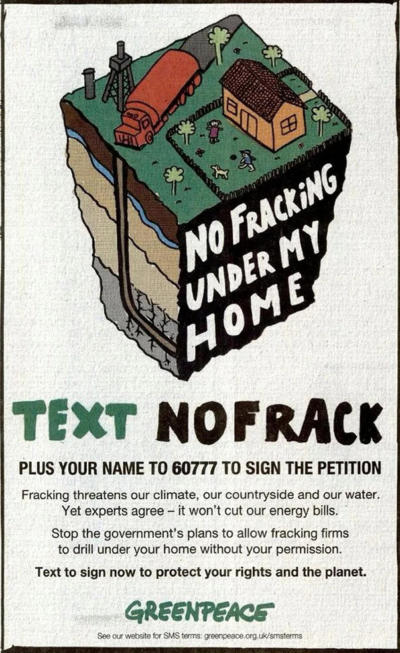The Advertising Standards Agency has reversed a ruling banning a Greenpeace anti-fracking advert, with the environmental group calling the U-turn an “embarrassment”.
Greenpeace had run a national press advert in January 2015 which opposed fracking. It read: "Fracking threatens our climate, our countryside and our water. Yet experts agree - it won't cut our energy bills".
Labour Peer Lord Lipsey challenged the claim that “experts agree – it won’t cut energy bills”, saying that this particular statement was both misleading and unsubstantiated. The ASA said in May 2015 that it was upholding the ruling, and that the advert could not be shown again in its current form. Greenpeace appealed the ruling, which it had called “baseless, biased and bonkers".
Today the regulator announced that it was over-turning that ruling, and that the complaint would not be upheld.

In the new ruling, the ASA acknowledges that “the general consensus among most appeared to be that a meaningful reduction in UK domestic energy bills was highly unlikely and/or was limited to a small number of potential scenarios.”
As a result it said: “We therefore considered the claim as it was likely to be interpreted by readers had been substantiated and was not materially misleading.”
U-turn an ‘embarrassment’
Hannah Martin, a Greenpeace UK fracking campaigner, said of the change in ruling: "This was a farcical attempt to stifle the crucial public debate on fracking, and it should have never happened. This U-turn is an embarrassment not just for the advertising watchdog but for all the industry advocates who keep touting fracking as the miracle cure to high energy bills.
“As the government desperately resorts to offering cash bribes to shore up support for this controversial industry, this decision will be a reminder that the benefits of fracking are, at best, uncertain whilst the side-effects are stark. Spoiling our countryside and increasing air pollution and climate-warming emissions are not a price worth paying for the sake of this industry. Theresa May should reverse the policies that have harmed our vibrant renewable energy sector and back the technologies that can supply home-grown energy for decades to come."
Related articles











